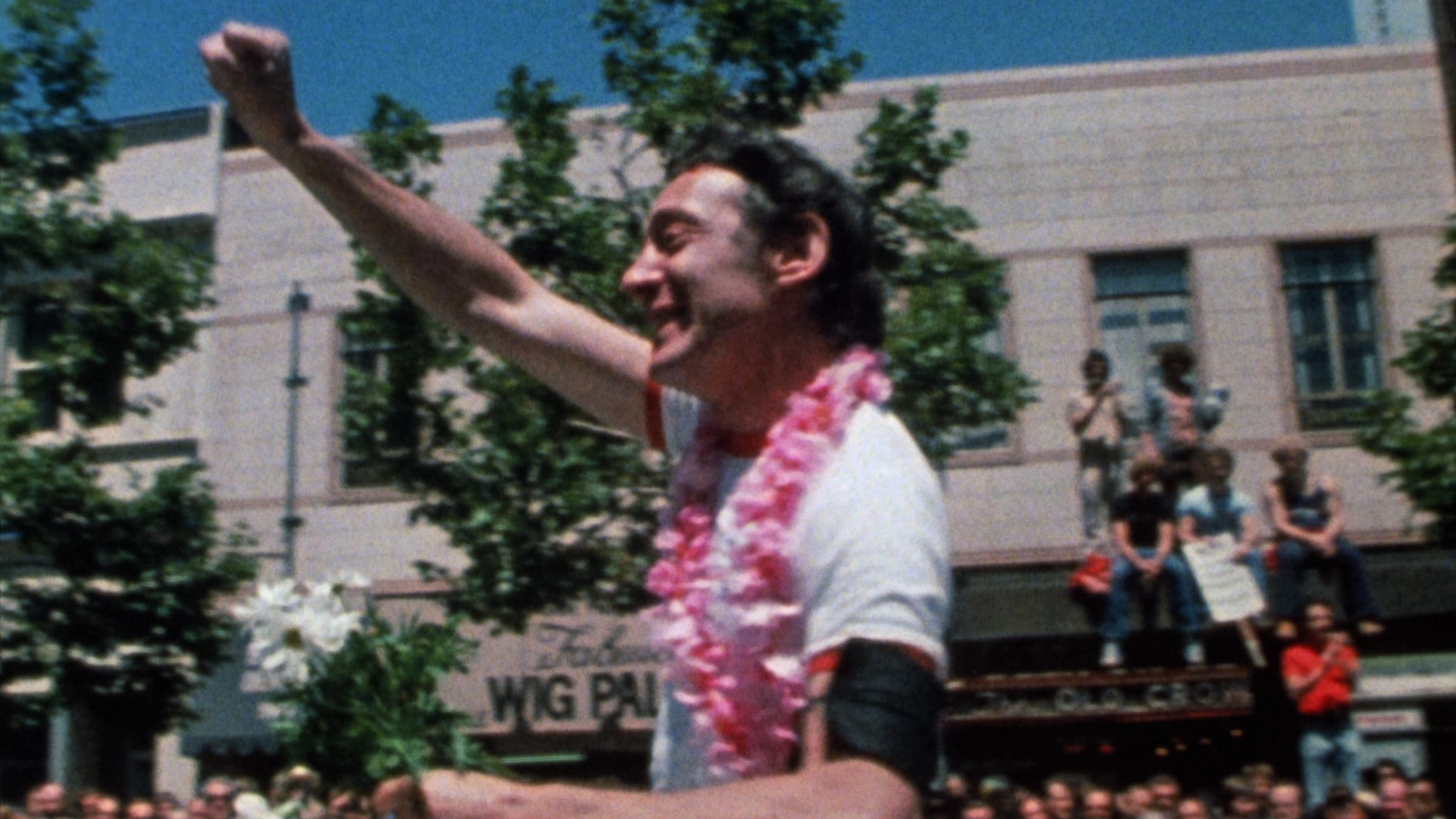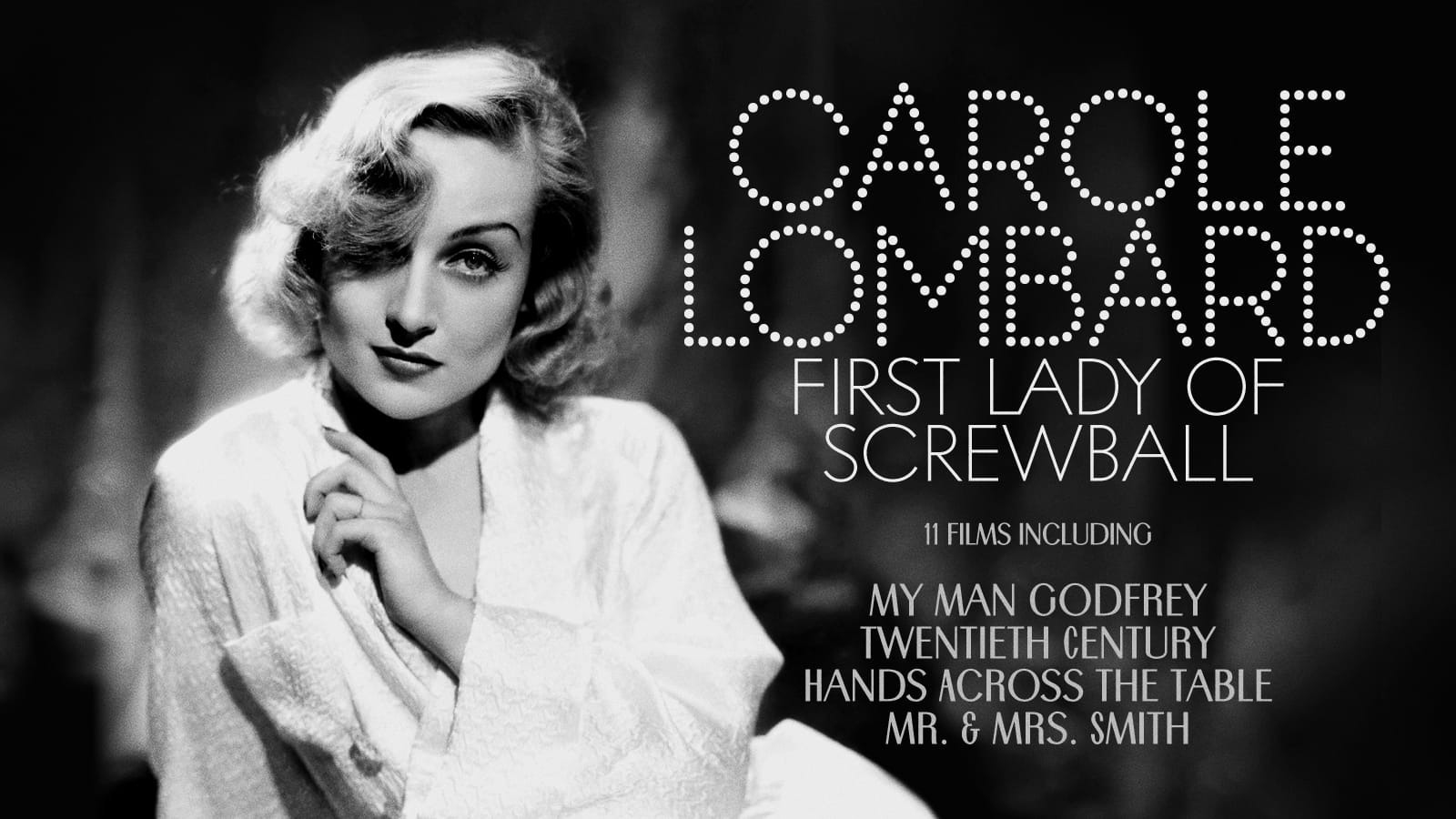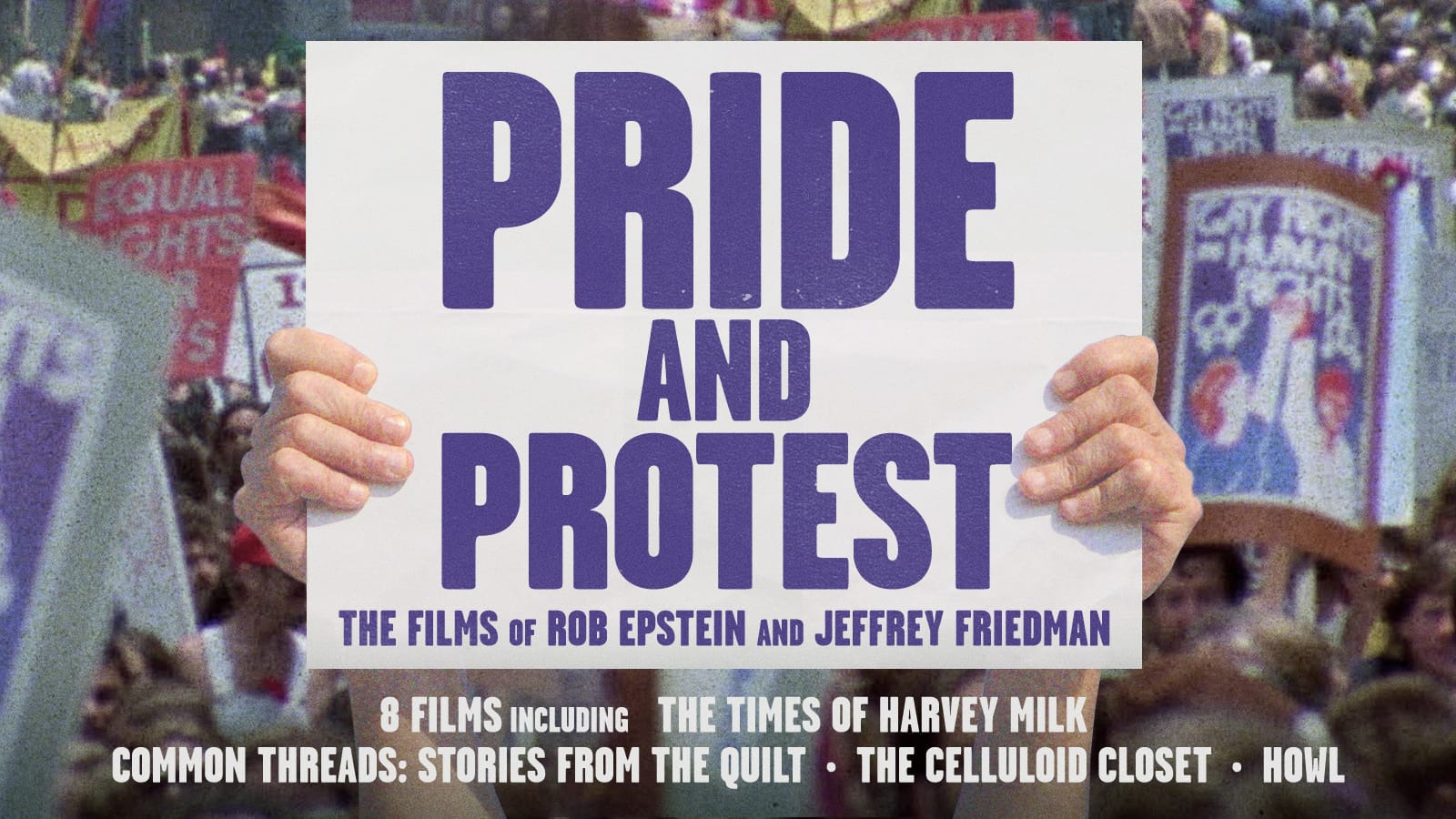The Criterion Channel’s June 2021 Lineup

The Times of Harvey Milk
The Criterion Channel’s June 2021 Lineup
Next month, the Criterion Channel celebrates Pride Month with a host of extraordinary queer-themed films, including a new installment of our Queersighted series focusing on taboo-breaking artists, a trio of outré underground classics from John Waters, and a restrospective dedicated to the nonfiction trailblazers Rob Epstein and Jeffrey Friedman, whose films have helped bring LGBTQ stories out of the closet and into the mainstream. There’s also a spotlight on screwball great Carole Lombard, a new installment of Adventures in Moviegoing with Justin Simien, and hundredth-birthday tributes to Judy Holliday, Jane Russell, and Luis García Berlanga.
* indicates programming available July 1
** indicates programming available only in the U.S.
Featured Series
Premiering June 1

Carole Lombard: First Lady of Screwball
Carole Lombard was already a Hollywood veteran when a whirlwind comedic revolution took Tinseltown by storm in the 1930s. The genre was screwball, and it fit Lombard like a glove. In definitive classics of the form like Hands Across the Table, Twentieth Century, My Man Godfrey, and Nothing Sacred, Lombard lit up the screen with her vivacious energy and brilliant comic timing (it’s no surprise that Lombard, who was married first to William Powell, then Clark Gable, was an inveterate prankster offscreen, with a famously foul mouth). Though her tragic death in a plane crash at age thirty-three—just after the completion of her final film, Ernst Lubitsch’s audacious anti-Nazi satire To Be or Not Be**—robbed Hollywood of one of its brightest stars, Lombard endures thanks to her rare combination of chic elegance and infectious irreverence.
Featuring: No Man of Her Own (1932), Virtue (1932), Twentieth Century (1934)*, Hands Across the Table (1935), My Man Godfrey (1936), Nothing Sacred (1937), True Confession (1937), In Name Only (1939), Vigil in the Night (1940), Mr. & Mrs. Smith (1941), To Be or Not to Be** (1942)

Adventures in Moviegoing with Justin Simien
What would the world look like if Charles Burnett and Kathleen Collins were spoken of in the same terms as Fritz Lang and Stanley Kubrick? That’s the question at the heart of this edition of Adventures in Moviegoing, in which Justin Simien, the creator of Dear White People and Bad Hair, sits down with fellow filmmaker Janicza Bravo to discuss the decades-long erasure of Black artists from the cinematic canon, the expectations and constraints faced by contemporary Black directors, and why, in Simien’s opinion, every Black film is an experimental film. Their incisive conversation is presented alongside a selection of some of Simien’s favorite touchstones of Black cinema, including Gordon Parks’s gorgeous coming-of-age odyssey The Learning Tree—the first major studio film made by an African American director—and Collins’s luminous character study Losing Ground.
Featuring: Symbiopsychotaxiplasm Take One (1968), The Learning Tree (1969), Losing Ground (1982), Ethnic Notions (1986), Sidewalk Stories (1989), To Sleep with Anger (1990), Daughters of the Dust (1991)

Pride and Protest: The Films of Rob Epstein and Jeffrey Friedman
For decades, the queer experience on-screen was defined by invisibility and marginalization. The trailblazing works of Rob Epstein and Jeffrey Friedman have been instrumental in changing that. Since the 1970s, when he contributed to the Mariposa Collective’s Word Is Out—a landmark documentary that shattered the public silence around LGBTQ lives in America—Epstein has been telling powerful stories that center the gay experience, including the Oscar-winning The Times of Harvey Milk. In the late eighties, he teamed up with Friedman to form the production company Telling Pictures, and the pair’s subsequent triumphs include an Academy Award–winning AIDS documentary (Common Threads: Stories from the Quilt), a groundbreaking revisionist history of Hollywood (The Celluloid Closet), and a narrative retelling of Allen Ginsberg’s 1957 obscenity trial (Howl). Urgent, stirring, and deeply humane, these films represent a major turning point in the cultural conversation surrounding LGBTQ issues and acceptance.
Featuring: Word Is Out: Stories of Some of Our Lives (1977), The Times of Harvey Milk (1984), The AIDS Show (1986), Common Threads: Stories from The Quilt (1989), Where Are We? Our Trip Through America (1992), The Celluloid Closet (1995), Paragraph 175 (2000), Howl (2010)

Bad Spaniard: 11 Scathing Satires by Luis García Berlanga
In the wake of the Spanish Civil War, Luis García Berlanga revitalized his country’s film industry by puncturing the sanctimony of Franco-era culture. Though less well-known internationally than his iconoclastic compatriot Luis Buñuel or his filmmaking disciple Pedro Almodóvar, Berlanga—who would have turned one hundred this month—was renowned in his home country for his sardonic, censor-skirting attacks on political repression, economic neglect, and false piety, spiked with ebullient screwball rhythms that delighted mainstream audiences. Overflowing with vivid characters and brilliantly orchestrated moments of absurdist humor, these films and their daring provocations—including Welcome Mr. Marshall!’s sly antinationalist satire, Plácido’s masterful takedown of upper-class hypocrisy, and The Executioner’s caustic attack on capital punishment—led Franco himself to declare, “Berlanga is not a Communist; he is worse than a Communist, he is a bad Spaniard.” A ringing endorsement if there ever was one!
Featuring: Welcome Mr. Marshall! (1953), Boyfriend in Sight (1954), The Rocket from Calabuch (1956), Miracles of Thursday (1957), Plácido (1961), The Executioner (1963), La boutique (1967), Long Live the Bride and Groom (1970), Patrimonio nacional (1981), Nacional III (1982), Everyone Off to Jail (1993)

Starring Judy Holliday
Featuring a new introduction by critic Farran Smith Nehme
Born one hundred years ago this month, Judy Holliday was a major star for only a decade, but the precious few screen performances she left behind are marvels of virtuoso comic timing and warmly human characterization. Having achieved renown on Broadway for her performance as the ditzy, squeaky-voiced Billie Dawn in Garson Kanin’s hit play Born Yesterday, Holliday was invited to reprise the role on-screen, becoming an overnight sensation and famously beating out both Bette Davis in All About Eve and Gloria Swanson in Sunset Boulevard for the Academy Award for best actress. Noted for her real-life smarts, Holliday would spend her subsequent career tweaking, and often slyly subverting, the “dumb blonde” image she had established in Born Yesterday, bringing shrewdness and poignancy to her performances in films like George Cukor’s prescient celebrity-culture satire It Should Happen to You and Vincente Minnelli’s musical charmer Bells Are Ringing. The latter proved to be Holliday’s final film before her untimely death at age forty-three cut short the brief but brilliant career of one of the finest comic actors to ever grace the screen.
Featuring: Born Yesterday (1950)*, The Marrying Kind (1952), It Should Happen to You (1954), Phffft! (1954), Full of Life (1956), The Solid Gold Cadillac (1956), Bells Are Ringing (1960)
Criterion Editions
Premiering June 1

Beyond the Valley of the Dolls (Russ Meyer, 1970)
Criterion Collection Edition #836
Transgressive and outrageous, this big-studio version of a debaucherous midnight movie is an addictively entertaining romp from Russ Meyer, one of cinema’s great outsider artists.
SUPPLEMENTAL FEATURES: Audio commentary featuring screenwriter Roger Ebert, an interview with filmmaker John Waters, interviews with the cast, making-of documentaries, and more.

Safe (Todd Haynes, 1995)
Criterion Collection Edition #739
Todd Haynes’s profoundly unsettling film functions on multiple levels: as a prescient commentary on self-help culture, as a metaphor for the AIDS crisis, as a drama about class and social estrangement, and as a horror film about what you cannot see.
SUPPLEMENTAL FEATURES: Audio commentary featuring Haynes, actor Julianne Moore, and producer Christine Vachon; a conversation between Moore and Haynes; and more.

Topsy-Turvy (Mike Leigh, 1999)
Criterion Collection Edition #558
The world of Gilbert and Sullivan comes to vivid life in director Mike Leigh’s lushly produced epic about the harsh realities of creative expression.
SUPPLEMENTAL FEATURES: Audio commentary featuring Leigh, a short film by Leigh, deleted scenes, a featurette on the film, and more.

Christ Stopped at Eboli (Francesco Rosi, 1979)
Criterion Collection Edition #1043
Francesco Rosi’s sublime adaptation of the memoirs of the painter, physician, and political activist Carlo Levi brings a monument of twentieth-century autobiography to the screen with quiet grace and solemn beauty.
SUPPLEMENTAL FEATURES: A documentary on Italian political cinema featuring Rosi and actor Gian Maria Volontè, an interview with writer and translator Michael F. Moore, an excerpt from a documentary featuring Rosi and Levi, and more.

Rosetta (Luc Dardenne and Jean-Pierre Dardenne, 1999)
Criterion Collection Edition #621
This swift and simple tale from the Dardenne brothers, winner of the Palme d’Or at Cannes, achieves stunning intimacy with its main character through raw, empathetic camera work.
SUPPLEMENTAL FEATURES: A conversation between the Dardenne brothers and critic Scott Foundas and interviews with actors Émilie Dequenne and Olivier Gourmet.

Scanners (David Cronenberg, 1981)
Criterion Collection Edition #712
David Cronenberg plunges us into one of his most terrifying and thrilling sci-fi worlds in a phenomenally gruesome and provocative film about the expanses and limits of the human mind.
SUPPLEMENTAL FEATURES: A documentary on the film’s special effects; interviews with actors Michael Ironside and Stephen Lack; Stereo, Cronenberg’s first feature; and more.

The Orphic Trilogy (Jean Cocteau)
Criterion Collection Edition #66
Decadent, subversive, and bristling with artistic invention, this trio of films by Jean Cocteau uses the myth of Orpheus to explore the complex relationships between the artist and his creations, reality and the imagination.
SUPPLEMENTAL FEATURES: Edgardo Cozarinsky’s documentary Jean Cocteau: Autoportrait d’un inconnu and Villa Santo Sospir, a 16 mm color film by Cocteau.































